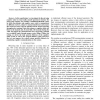Free Online Productivity Tools
i2Speak
i2Symbol
i2OCR
iTex2Img
iWeb2Print
iWeb2Shot
i2Type
iPdf2Split
iPdf2Merge
i2Bopomofo
i2Arabic
i2Style
i2Image
i2PDF
iLatex2Rtf
Sci2ools
GLOBECOM
2007
IEEE
2007
IEEE
Spectral Efficiency of Cognitive Radio Systems
In this contribution1 , we investigate the idea of using cognitive radio to reuse locally unused spectrum to increase the total system capacity. We consider a multiband/wideband system in which the primary and cognitive users wish to communicate to different receivers, subject to mutual interference and assume that each user knows only his channel and the unused spectrum through perfect sensing. Under this scheme, a cognitive radio will listen to the channel and, if sensed idle, will transmit during the voids. We impose the constraint that users successively transmit over available bands through proper water filling. Within this setting, we derive the total spectral efficiency of the cognitive radio system as well as the spectral efficiency gains and prove that we can improve the overall system spectral efficiency by considering cognitive communications in the system.
| Added | 16 Aug 2010 |
| Updated | 16 Aug 2010 |
| Type | Conference |
| Year | 2007 |
| Where | GLOBECOM |
| Authors | Majed Haddad, Aawatif Menouni Hayar, Mérouane Debbah |
Comments (0)

